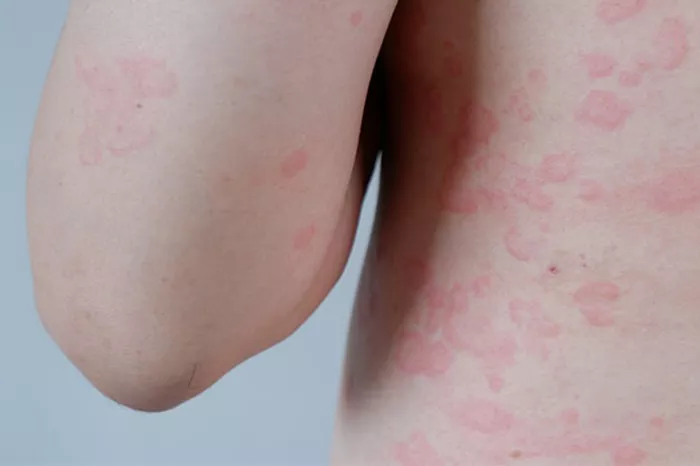Aquagenic urticaria, often referred to as water allergy, is a rare and intriguing condition that causes hives to appear on the skin upon contact with water, regardless of its temperature. This condition can severely impact the quality of life of those affected, making it important to understand the underlying causes of Aquagenic urticaria. This article delves into the etiology of aquagenic urticaria, exploring genetic factors, immune responses, and environmental influences.
What is Aquagenic Urticaria?
Aquagenic urticaria is classified as a physical urticaria, a type of chronic hives triggered by physical stimuli. Unlike other forms of urticaria, which may be triggered by allergens, heat, or cold, aquagenic urticaria occurs specifically when the skin comes into contact with water. This reaction can be triggered by different forms of water exposure, including bathing, swimming, rain, and even sweat or tears.
Symptoms and Diagnosis
The primary symptom of aquagenic urticaria is the rapid onset of itchy, red welts on the skin that occur within minutes of water exposure. These hives typically persist for 30 minutes to an hour before subsiding. Other symptoms may include a burning or stinging sensation on the skin. Diagnosis is typically made through patient history and physical examination, often supported by water challenge tests where water is applied to the skin to observe the reaction.
Genetic Factors and Aquagenic Urticaria
Hereditary Links
While aquagenic urticaria is rare, there have been instances suggesting a possible hereditary component. Some case studies report multiple family members being affected by the condition, indicating that genetic factors may play a role. However, there is no conclusive evidence of a specific gene responsible for aquagenic urticaria, and more research is needed to identify any potential genetic markers.
Genetic Mutations
Researchers hypothesize that mutations in certain genes may contribute to the development of aquagenic urticaria. These mutations could potentially affect the proteins involved in skin barrier function or the immune response to water exposure. For instance, abnormalities in genes related to the epidermal barrier might predispose individuals to heightened skin sensitivity, making them more susceptible to developing hives upon water contact.
Immune System and Hypersensitivity Reactions
Mast Cell Activation
One of the central mechanisms in the development of aquagenic urticaria involves the activation of mast cells. Mast cells are immune cells that play a crucial role in allergic reactions and inflammatory responses. When activated, they release histamine and other inflammatory mediators, leading to the characteristic symptoms of urticaria, such as itching and swelling.
Role of Histamine
Histamine release is a key factor in the development of aquagenic urticaria. Histamine binds to receptors on blood vessels, causing them to dilate and become more permeable. This results in fluid leakage into surrounding tissues, leading to the formation of hives. The exact trigger for mast cell activation in aquagenic urticaria is not fully understood, but it is believed that water acts as a physical stimulus that somehow prompts this immune response.
Hypersensitivity Type
Aquagenic urticaria is considered a type I hypersensitivity reaction. Type I hypersensitivity reactions are immediate allergic reactions mediated by IgE antibodies. These antibodies bind to allergens and trigger mast cell degranulation, leading to the release of histamine and other mediators. However, in the case of aquagenic urticaria, the allergen is not a foreign substance but water itself, making it a unique and poorly understood form of hypersensitivity.
Environmental and External Factors
Water Composition
Interestingly, the composition of water can influence the severity of aquagenic urticaria. Factors such as pH levels, mineral content, and the presence of chlorine or other chemicals can exacerbate the condition. Some individuals report worse reactions with tap water compared to distilled water, suggesting that impurities or additives in the water may contribute to the urticarial response.
Skin Condition and Barrier Function
The condition of the skin barrier also plays a significant role in the susceptibility to aquagenic urticaria. A compromised skin barrier, which can result from conditions such as eczema or dermatitis, may increase the likelihood of developing hives upon water exposure. Healthy skin typically acts as a protective barrier, preventing excessive water absorption and subsequent mast cell activation. When this barrier is compromised, the skin becomes more permeable, allowing water to penetrate and trigger an immune response.
Hormonal and Physiological Influences
Hormonal Fluctuations
Hormonal changes, particularly in women, can influence the severity of aquagenic urticaria. Some women report an increase in symptoms during certain phases of their menstrual cycle, suggesting that hormonal fluctuations may modulate immune responses and skin sensitivity. Additionally, pregnancy and menopause, which involve significant hormonal shifts, have been linked to changes in the severity of aquagenic urticaria.
Psychological Stress
Psychological factors, including stress and anxiety, can exacerbate symptoms of aquagenic urticaria. Stress is known to affect immune function and skin health, potentially increasing the frequency and intensity of urticarial reactions. Stress management techniques, such as mindfulness and relaxation exercises, may help mitigate the impact of stress on aquagenic urticaria.
Potential Role of Neurogenic Inflammation
Neurogenic Pathways
Recent research has suggested that neurogenic inflammation might play a role in aquagenic urticaria. Neurogenic inflammation involves the activation of sensory nerves, which release neuropeptides that can contribute to inflammation and mast cell activation. This pathway is known to play a role in other types of chronic hives and might also be relevant in aquagenic urticaria.
Interaction with Mast Cells
The interaction between sensory nerves and mast cells can create a feedback loop, where nerve activation leads to mast cell degranulation and histamine release, which in turn stimulates further nerve activation. This cycle can amplify the urticarial response to water exposure, making it more severe and prolonged.
Clinical Management and Treatment Options
Antihistamines
The primary treatment for aquagenic urticaria involves the use of antihistamines, which block histamine receptors and reduce the severity of symptoms. Non-sedating antihistamines, such as cetirizine and loratadine, are often preferred for long-term use. In cases where standard doses are ineffective, higher doses or a combination of different antihistamines may be prescribed.
Topical Treatments
Topical treatments, such as corticosteroid creams, can help manage localized symptoms of aquagenic urticaria. These treatments reduce inflammation and can provide relief from itching and swelling. Additionally, barrier creams and emollients can help strengthen the skin barrier, reducing its permeability to water and potentially decreasing the frequency of urticarial reactions.
Immunosuppressants and Biologics
In severe cases of aquagenic urticaria that do not respond to standard treatments, immunosuppressants or biologic therapies may be considered. Medications such as cyclosporine, which suppress immune function, can help control symptoms. Biologic therapies, such as omalizumab (an anti-IgE antibody), have shown promise in treating chronic urticaria by targeting specific components of the immune response.
Lifestyle Modifications
Lifestyle modifications can also play a crucial role in managing aquagenic urticaria. Patients are advised to limit water exposure and to use water that is at a comfortable temperature. Wearing protective clothing, such as waterproof gloves, can help prevent skin contact with water during activities like washing dishes or cleaning. Additionally, using mild, hypoallergenic skincare products can reduce the risk of skin irritation and subsequent urticarial reactions.
Research and Future Directions
Advancements in Genetic Research
Ongoing research aims to identify specific genetic factors involved in aquagenic urticaria. Advances in genetic sequencing and molecular biology techniques may uncover mutations or polymorphisms associated with this condition. Understanding the genetic basis of aquagenic urticaria could lead to the development of targeted therapies and personalized treatment approaches.
Immunological Studies
Further immunological studies are needed to elucidate the precise mechanisms of mast cell activation in response to water exposure. This research could help identify new therapeutic targets and improve the effectiveness of existing treatments. Additionally, exploring the role of neurogenic inflammation and its interaction with the immune system could provide new insights into the pathophysiology of aquagenic urticaria.
Innovative Treatment Approaches
Innovative treatment approaches, such as gene therapy or advanced biologic agents, hold promise for the future management of aquagenic urticaria. Gene therapy could potentially correct underlying genetic abnormalities, while novel biologic agents could specifically target the pathways involved in mast cell activation and histamine release. Continued research and clinical trials will be essential to bring these therapies from the laboratory to clinical practice.
Conclusion
Aquagenic urticaria is a rare and complex condition that poses significant challenges for those affected. While the exact causes remain elusive, current understanding points to a multifactorial etiology involving genetic predispositions, immune system dysregulation, environmental influences, and potentially neurogenic inflammation. Ongoing research is crucial to unraveling the mysteries of this condition and developing effective treatments. Through continued advancements in genetic, immunological, and clinical research, there is hope for improved management and quality of life for individuals with aquagenic urticaria.
[inline_related_posts title=”You Might Be Interested In” title_align=”left” style=”list” number=”6″ align=”none” ids=”9482,9479,9419″ by=”categories” orderby=”rand” order=”DESC” hide_thumb=”no” thumb_right=”no” views=”no” date=”yes” grid_columns=”2″ post_type=”” tax=””]


































